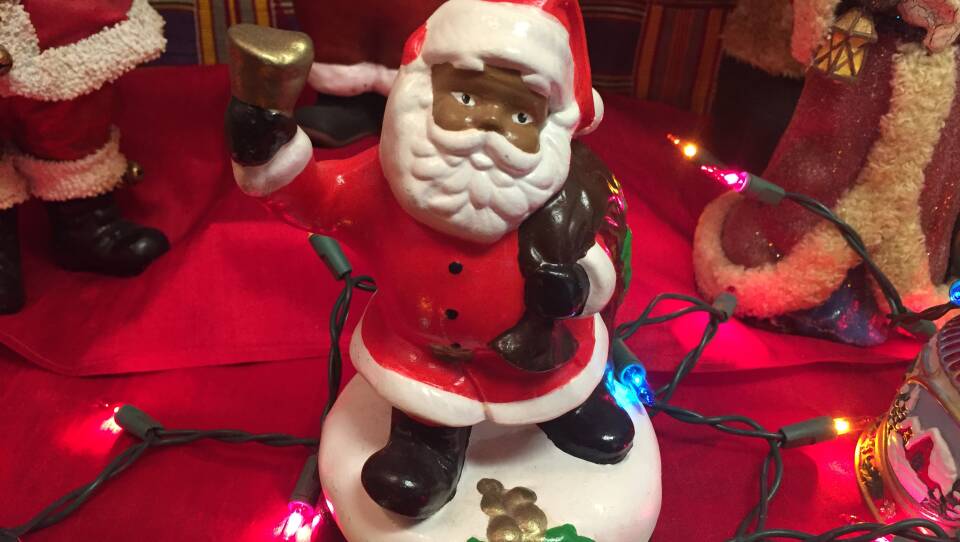Remember that feeling you had as a kid, happily — if impatiently — waiting to open your gifts? And the sheer unbridled delight of finally getting to rip open the packages on Christmas morning? That’s exactly how I feel the weekend after Thanksgiving when I unwrap my Black Santas. I channel my childhood joy as I cut the protective bubble wrap to reveal each of them, almost as if I’m seeing them for the first time.
As many of you know, I love Black Santa. And I look forward to a now annual ritual of decorating my office with as many as the brown, cherub-cheeked Kris Kringles that can fit on my desk, shelves, walls and door. They are something to see: tall and tiny, sumptuously attired in gold and silver, or simply dressed in Santa Claus red. Their faces represent the rich variation in African American skin tones from shades of mocha to deep espresso. My Black Santas stand, sit and hang — some a part of traditional Christmas scenes of chimneys, cookies and milk, as well as others wearing COVID-19 masks, a reminder of these challenging times. This jolliest group of St. Nicks delights all who stop by my office to "ooh" and "ahh." And they fill me with the spirit of the season as I do my work in their midst.
WATCH: Walk into Callie Crossley’s Black Santa collection
I saw my first Black Santa long ago at the home of a family friend. She’d made it herself because she’d never seen a Black Santa. She gifted me with her homemade treasure, sparking my yearslong search ever since.
My collection was never meant to be a response to some who’ve been vocal about their disapproval, claiming — including a former cable news anchor who will not be named and once declared, “For all you kids watching at home, Santa just is white.” Thankfully, many rejected that opinion, recognizing that representation matters.
Real-life Black Santas like Santa Larry have broken barriers. In 2016, he was the first Black Santa hired by Minnesota’s Mall of America, the largest mall in the United States.
And this year, more people are telling Black Santa’s story. The 10-minute short film “Black Santa” is a comedy starring the fictional mall Black Santa Henry, whose son Otis has long worked alongside him as an elf. But now Otis is a tween and embarrassed by his dad. The film was co-sponsored by Indeed, the job website, and Rising Voices, a film mentorship for filmmakers of color. In a poignant exchange, Henry tells his son he’s playing Black Santa for him so he could see a magical Black character who looked like him.
HBO Max’s “Santa Camp” is a documentary centered on the New England Santa Society’s attempt to diversify its ranks beyond white men who are straight and physically able. One of the new recruits is Arkansas resident Chris Kennedy, who in 2020 got a racist note in his mailbox after putting an inflatable Black Santa on his lawn. Chris’ mostly white neighbors were appalled and responded by putting Black Santas in their yards in support. Filmmaker Nick Sweeney captures Chris in a full-circle moment studying to be a professional Black Santa and getting his first big gig at a North Little Rock Christmas Festival. Santa Chris told the Salon website, “I have not had a single kid ever say anything about Santa being Black. They are simply happy to see Santa.”
I’ve always appreciated all kinds of Santas and get a kick out of seeing the ones displayed in the homes of friends who are not African American. But Black Santa offers something special to me. Surrounded by my treasured collection, I’m embracing all the seasonal cheer I can, and wishing all of you happy holidays.







